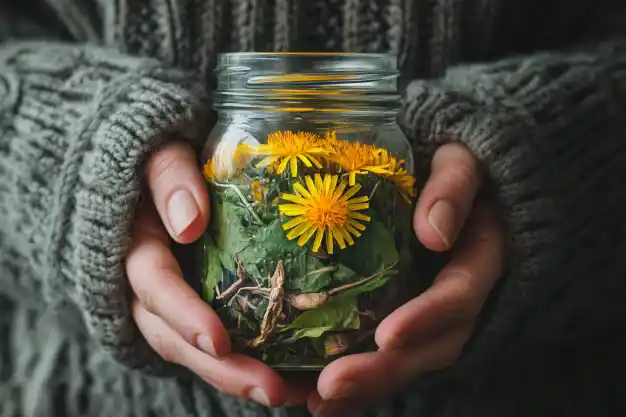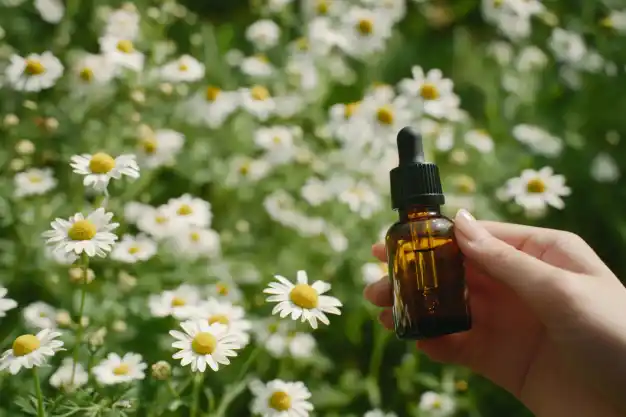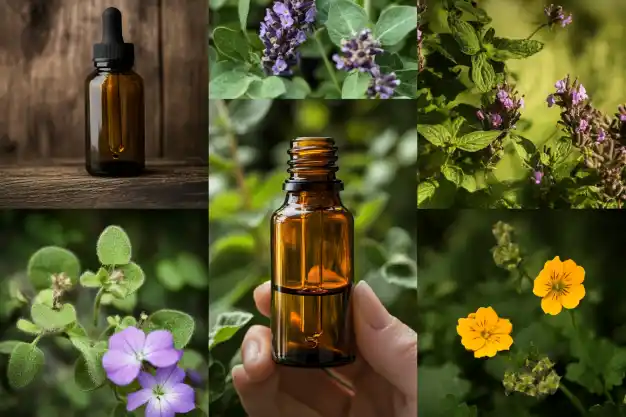Herbal tinctures are a cornerstone of traditional and modern herbal medicine. These concentrated liquid extracts capture the beneficial compounds of herbs, offering a convenient and potent way to support health naturally. Whether you’re looking to boost immunity, soothe digestion, or ease stress, herbal tinctures are a versatile remedy that can be tailored to your wellness needs.
In this comprehensive guide, we’ll explore what herbal tinctures are, how to make them, share 10+ effective recipes, and provide essential tips to help you master the art of tincture crafting.
What Are Herbal Tinctures?
Herbal tinctures are highly concentrated liquid herbal extracts made by soaking fresh or dried herbs in alcohol, vinegar, or glycerin. This process extracts the active compounds from the plant material, creating a shelf-stable liquid that can be easily administered. A few drops of tincture can provide powerful therapeutic benefits, making it an essential component of many home apothecaries.
Benefits of Herbal Tinctures
- Convenience: Small and portable, tinctures are easy to take on the go.
- Potency: Highly concentrated, requiring only a small dose for effectiveness.
- Versatility: Can be used for various ailments, from stress relief to boosting immunity.
- Long Shelf Life: Alcohol-based tinctures can last for years when stored properly.
- Customizable: Create unique blends to address specific health needs.
How to Make a Herbal Tincture
Crafting your own herbal tinctures is surprisingly simple and rewarding. With a few basic tools and ingredients, you can create personalized remedies that are both effective and affordable.
Ingredients Needed
- Alcohol: Use vodka or brandy (80–100 proof) for best results.
- Herbs: Fresh or dried herbs depending on availability and potency.
- Equipment: Clean glass jars, cheesecloth or muslin, and dark dropper bottles for storage.
Step-by-Step Guide
- Prepare the Herbs
- For fresh herbs: Rinse and pat dry to remove dirt and impurities. Chop them finely.
- For dried herbs: Use as is, as they are already preserved.
- Combine Herbs and Alcohol
- Place the herbs in a glass jar, filling it halfway for dried herbs or three-quarters full for fresh herbs.
- Pour alcohol over the herbs, ensuring they are fully submerged.
- Seal and Store
- Tightly seal the jar and store it in a cool, dark place for 4–6 weeks. Shake the jar daily to enhance extraction.
- Strain the Tincture
- After the infusion period, strain the liquid through a cheesecloth or fine mesh sieve into a clean jar.
- Bottle and Label
- Transfer the tincture into dark dropper bottles to protect it from light. Label with the herb name and preparation date.

10+ Herbal Tincture Recipes
Immune-Boosting Tinctures
1. Elderberry Tincture
- Benefits: Rich in antioxidants, elderberry supports immune health and helps reduce the severity of colds and flu.
- Recipe: Combine dried elderberries with vodka, steep for 4 weeks, then strain.
2. Echinacea Tincture
- Benefits: Boosts immunity and reduces the duration of colds.
- Recipe: Use fresh or dried echinacea roots for maximum potency.
3. Astragalus Tincture
- Benefits: Enhances immunity, energy levels, and overall vitality.
- Recipe: Slice fresh astragalus root thinly and infuse in alcohol for 6 weeks.
Digestive Health Tinctures
4. Peppermint Tincture
- Benefits: Relieves bloating, indigestion, and nausea.
- Recipe: Steep dried peppermint leaves in vodka for 3–4 weeks.
5. Ginger Tincture
- Benefits: Eases nausea, motion sickness, and digestive discomfort.
- Recipe: Grate fresh ginger and infuse in alcohol for 4 weeks.
6. Dandelion Tincture
- Benefits: Supports liver health and aids digestion.
- Recipe: Use fresh dandelion roots for the most effective tincture.
Stress and Relaxation Tinctures
7. Holy Basil (Tulsi) Tincture
- Benefits: An adaptogen that helps combat stress and improve mental clarity.
- Recipe: Infuse dried holy basil leaves in alcohol for 4–6 weeks.
8. Valerian Root Tincture
- Benefits: Promotes relaxation and better sleep.
- Recipe: Use dried valerian root, as it has a more concentrated effect.
9. Lavender Tincture
- Benefits: Eases anxiety and promotes restful sleep.
- Recipe: Combine dried lavender flowers with vodka for a calming remedy.
Anti-Inflammatory and Pain Relief Tinctures
10. St. John’s Wort Tincture
- Benefits: Alleviates mild depression and nerve pain.
- Recipe: Harvest fresh St. John’s Wort flowers for optimal potency.
11. Turmeric Tincture
- Benefits: Reduces inflammation and supports joint health.
- Recipe: Combine fresh turmeric root with vodka, infusing for 4 weeks.
12. Feverfew Tincture
- Benefits: Helps prevent migraines and relieve headache symptoms.
- Recipe: Use fresh feverfew leaves for the best results.
Additional Tips for Making and Using Herbal Tinctures
- Dosage: Begin with 1–2 dropperfuls (approximately 20–40 drops), diluted in water or tea. Adjust as needed based on the tincture’s strength.
- Storage: Store tinctures in dark glass bottles in a cool, dry place to preserve their potency.
- Alcohol-Free Alternatives: Substitute alcohol with vegetable glycerin or apple cider vinegar for a gentler option.

Risks and Precautions
While herbal tinctures are generally safe, some precautions should be taken:
- Side Effects: Overuse can lead to side effects such as stomach upset or mild allergic reactions.
- Pregnancy and Children: Avoid alcohol-based tinctures for children and pregnant women unless directed by a healthcare professional.
- Medication Interactions: Consult with a healthcare provider if you’re taking medications, as certain herbs can interfere with their effectiveness.
Frequently Asked Questions
Q1: Can I use fresh herbs instead of dried?
Yes! Fresh herbs can be used, but you may need to increase the volume as they contain more moisture, which dilutes the tincture slightly.
Q2: How long do tinctures last?
When stored properly, alcohol-based tinctures can last for 2–3 years. Alcohol acts as a preservative, maintaining the potency of the tincture.
Q3: Are tinctures safe for children?
For children, it’s better to use alcohol-free tinctures made with vegetable glycerin. Always consult a pediatrician before administering any herbal remedy to children.
Related Articles and Resources
- How to Grow and Harvest Medicinal Herbs
- DIY Herbal Salves and Balms: A Beginner’s Guide
- Herbal Tincture Recipes for Beginners
Conclusion
Creating your own herbal tinctures is a satisfying and empowering way to take control of your health naturally. With just a few ingredients and some patience, you can craft remedies tailored to your specific needs. Whether you’re boosting immunity, soothing digestion, or simply adding to your wellness toolkit, these tincture recipes will guide you every step of the way.
Start your herbal medicine journey today and experience the healing power of plants!

